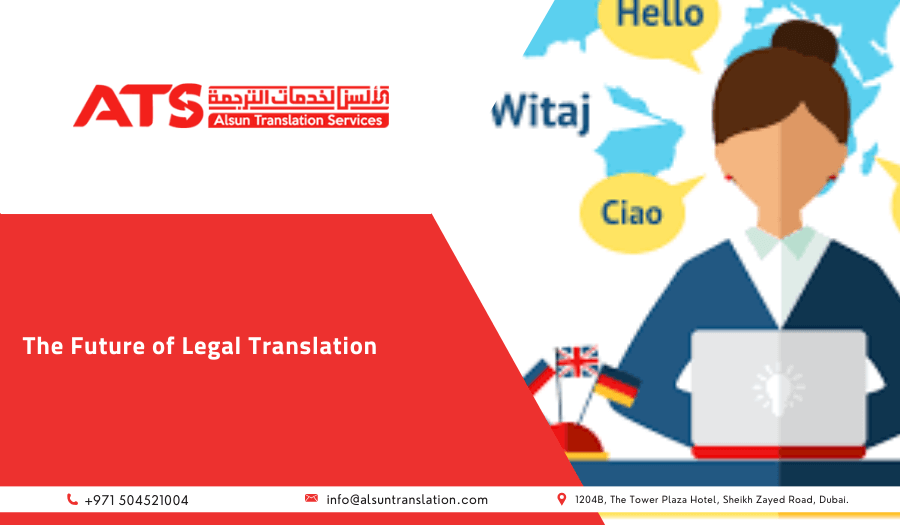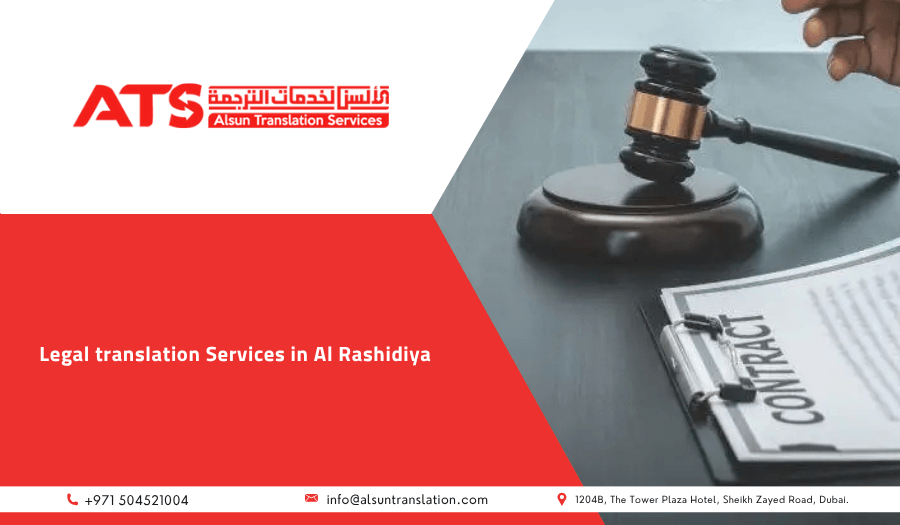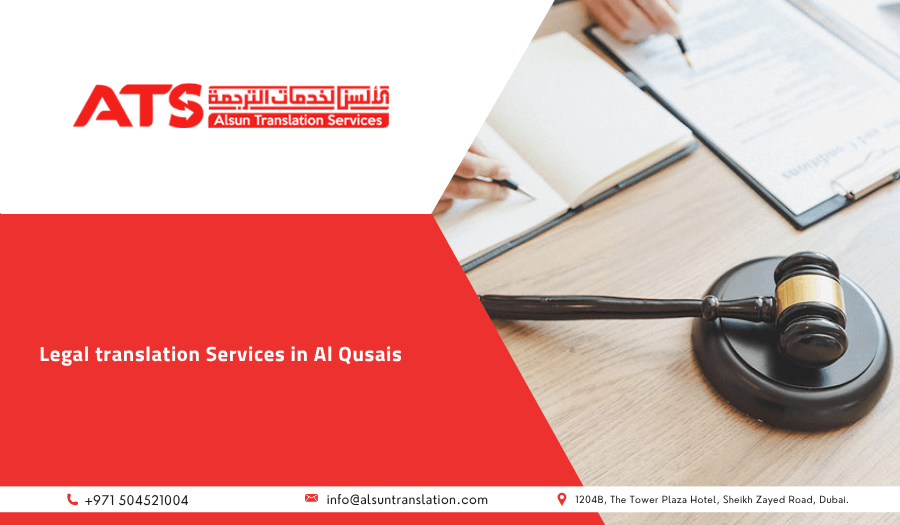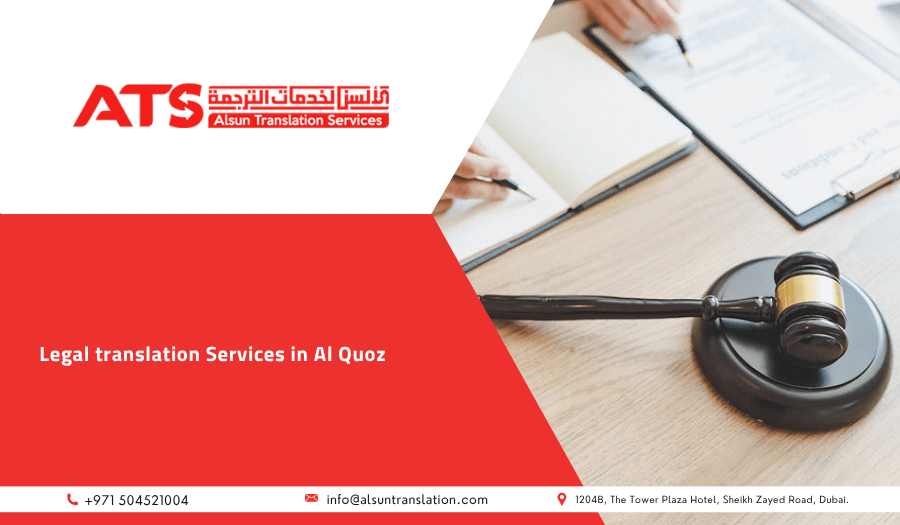Legal translation is a field that depends on accuracy and competence. In a city like Dubai that has become the destination of many nationalists around the world doing business, the need for accurate legal translation becomes a demand to improve communication and facilitate legal procedures for foreigners.
However, legal translation cannot depart from the progress of technology in the translation field. This blog will discuss the future of legal translation in the shadow of advanced technology and AI.
The Importance of Legal Translation
Legal translation involves the accurate and precise translation of legal documents and texts from one language to another while maintaining legal integrity. It encompasses the translation of legal terminology, concepts, and specialized language found in various legal documents like contracts, agreements, court rulings, statutes, and regulations.
Effective legal translation requires a deep understanding of the source and target legal systems and proficiency in the languages involved.
The Role of Legal Translators
Translators must possess extensive knowledge of legal terminology, procedures, and principles in both legal systems to ensure precise and faithful translations. Their roles extend beyond linguistic translation; they must also consider cultural, social, and historical differences that can affect the interpretation and application of legal concepts.
Translated legal documents must preserve the same legal impact and convey the intended meaning of the original text. It is essential to accurately reflect the source language’s legal rights, obligations, and consequences into the target language. They also have to keep up with the developments that may occur in the translation field and shape the legal translation future.
Future of Legal Translation and Machine Translation
It is easy to get any translation quickly from online programs that rely on machine translation, but this method will not be useful for legal documents. This is because machine translation programs don’t produce accurate translations, especially for specialized texts like legal ones. Legal language is specific and more difficult than any other field, as it depends on the culture of the country and the legal system ruled there. In addition, legal terminology could have multiple meanings, and machine translations would not be able to figure out the most suitable equivalent for that intended meaning.
The Difference between Machine Translation and Human Translations
Translation has drastically changed in recent years due to artificial intelligence. Machine translation has dramatically improved, resulting in fewer mistranslations and more natural language use. Consequently, many people increasingly rely on these tools instead of human translators to translate various documents.
However, human translators are the only trusted choice to get accurate translations without errors, especially in specialized fields like legal and medical fields. Let’s discover the key differences between machine and human translations in the following table:
| Machine Translation | Human Translation | |
| Quality | Machine translation is not 100% accurate in all fields. It cannot choose the proper term that reflects the intended meaning of the original text. |
Human translation provides higher accuracy, particularly for legal and technical documents. It can make well-informed decisions on the most appropriate translations. |
|
Speed |
In legal proceedings, meeting deadlines is of utmost importance. If swift turnaround time is a priority, MT surpasses other options. It can swiftly translate vast volumes of data that would be impossible for humans to match. | Human translation cannot be faster than machine translation, as translators give priority to the quality of the translation and try to do it in a short time using translation memories and advanced CAT. |
| Cost | Significant cost savings can be achieved by opting for MT over human translators. MT’s unparalleled efficiency and speed contribute to reducing expenses. |
Human translation is more expensive than machine translation, as the cost of the translator is determined according to his experience, translation field, and language pair. |
Saving time and cost might cost you the quality and accuracy of legal translation, which is what institutions and official entities seek in legal documents and contracts. Therefore, the legal translator will always be the best choice to maintain the quality and accuracy of the translation.
AI and Human Expertise in Legal Translation Services
There are a range of powerful tools and software solutions that are supported by AI to meet the needs of the specialized legal field. These tools streamline the translation process and enhance the quality and precision of legal translations.
With these innovative tools which shape the future of legal translation, language professionals can confidently undertake legal translations, ensuring their work’s utmost precision and reliability in a short time.
Let’s tackle some of these tools that legal translators could use in their work:
- MemoQ
MemoQ is a leading computer-assisted translation (CAT) tool that effectively streamlines the legal translation process. Utilizing features such as translation memory, terminology management, and automatic quality assurance tools, memoQ accelerates the translation process and enhances the overall quality.
Its consistent approach to language translation and specialization in domain-specific terminology instills confidence in language professionals when undertaking legal document translation.
- SDL Trados
SDL Trados is another noteworthy CAT tool for legal and certified translation services. It empowers translators to work at double speed while ensuring accuracy by avoiding ambiguities, inconsistencies, and other errors.
SDL Trados offers stringent control over access rights, particularly valuable for those working on legal documents who can rely on the software to prevent any potential legal issues from incorrect translations.
- Linguee
Linguee is a valuable resource for legal translators, providing a robust multilingual dictionary that offers reassurance and support. Going beyond a traditional dictionary, Linguee enables users to search through a vast database of 1,000,000,000 translations, encompassing both words and expressions.
Additionally, Linguee allows users to verify context and even access relevant images. This convenient tool also offers insights into how others have translated specific phrases, enhancing its utility for legal translation professionals.
Is machine translation reliable and trusted?
Without a doubt, machine translation saves time and can generate good translations for many standard phrases and conventional sentences. Nevertheless, specific observations become apparent as one continues working with these tools, including:
- They do not always capture the essence of the target language.
- They lack consciousness, which is the primary challenge faced by AI.
Attempting to confine it within a complex network of rules, such as legal documents, remains a distant possibility. Consequently, machine translation often feels like ill-fitting clothes, as its output is never custom-made for the specific task but rather a generic “one size fits all” result.
The Best Time to Use Machine Translation
Machine Translation is prone to introducing errors and often lacks the natural flow and idiomatic expressions found in human translations. While budget and speed may be primary concerns, they are not the sole factors to consider when utilizing MT. You can use machine translation only for the following:
- Non-critical content: When the translated content is not crucial for legal proceedings or solely intended for internal discovery purposes.
- Only gisting: When the translation is required for basic understanding and actionability, allowing for acceptable errors as long as the overall message is comprehensible.
- Straightforward content: When the content is explicit, devoid of cultural nuances and creative expressions.
Human Legal Translation is A Must!
On the other hand, some situations warrant the use of human translation despite advancements in AI and neural machine translation:
- Legal priority: When the content is significant to the legal team and necessitates utmost accuracy.
- Cultural understanding: When the content relies on cultural context and demands in-depth knowledge.
- Creative language: When legal documents employ creative language that machines cannot effectively translate.
- Complex projects: When the project is intricate and calls for collaboration among professional translators.
Legal Translators and AI Advancements
In light of the changes that may occur in the future of legal translation, Legal translators can take proactive steps to keep up with AI advancements and preserve their role in the face of technological advances. Here are some strategies:
Continuous learning
Stay updated on the latest AI and machine translation technology developments. Attend industry conferences, workshops, and webinars to learn about new tools and techniques. Keep up with research papers and publications in natural language processing and machine learning.
Specialize in complex legal content
Focus on legal translation areas requiring specialized knowledge and expertise. Develop proficiency in translating complex legal documents, contracts, intellectual property, or specialized legal fields. This specialization makes it harder for AI to replace human translators due to the intricacies and nuances involved.
Offer value-added services
Provide services that go beyond translation. Offer additional expertise, such as legal consulting, localization, cultural adaptation, or quality assurance. Position yourself as a language professional who understands the legal context and can provide comprehensive solutions.
Embrace AI tools
Incorporate AI translation tools into your workflow to enhance efficiency and productivity. Learn to use machine translation systems as a starting point and leverage AI-powered tools for terminology management, quality control, and post-editing. This way, you can work in tandem with AI, utilizing it as a valuable tool rather than perceiving it as a threat.
Cultivate client relationships
Build strong relationships with clients by offering personalized services and understanding their needs. Highlight the advantages of human translation, such as accuracy, cultural sensitivity, and subject matter expertise.
Adapt and evolve
Be open to change and adapt your skills to meet evolving industry demands. Stay agile and embrace new technologies like cloud-based translation platforms, collaborative tools, and project management systems. Constantly assess and upgrade your skill set to stay competitive in the changing landscape.
Hire the Best Legal Translators in Dubai
Alsun Legal Translation has the best team of legal translators who have more than 5 years of practical experience in the legal field and good knowledge of AI advancements to keep up with new updates and do the largest projects in the shortest time possible.
Whatever the complexity and type of your project, our translators are ready to handle it competently, complying with the legal and official standards. Cooperating with human legal translators of Alsun saves your time and money, as they provide accurate legal translations for contracts, agreements, and any legal document into more than 100 languages.
Also know: A Guide to Finding the Best Legal Translation Provider
Why Choose Alsun for Legal Translation Services?
If you’re looking for comprehensive legal translation services with the highest quality, you can trust Alsun Legal Translation. We are certified by the Ministry of Justice in the UAE to provide the required certified translations for the official institutions, such as courts, embassies, or universities. We realize the future of legal translation and keep up with the updates.
Our services are not limited to legal translations but also cover medical, technical, and financial translations. We also provide interpretation services, proofreading services, and DTP services.
We stand out for our commitment to project delivery deadlines in the shortest time without compromising the quality by using CAT tools that maintain the quality and consistency of terms in the whole document.
You can get a free quote for your project once you contact us via WhatsApp or email. Just send us a message and let us handle your projects.
Also know: What is a legal translation?
Conclusion
In conclusion, the future of legal translation is shaped by AI, which has transformed the industry but won’t replace human translators entirely. AI has improved machine translation tools yet struggles with context and nuances. Integrating AI offers cost and time savings, especially for large datasets, but human translators are crucial for quality.
The future lies in a collaborative approach, combining AI power with human expertise. Just as transcreation relies on humans, translators ensure accurate conveyance. This future blends technology and human ingenuity, creating growth opportunities. By embracing AI’s potential while upholding human artistry, legal translation holds promise for translators and clients.
If you are looking for legal translation services, it is important to choose a provider that is up-to-date on the latest trends and innovations. This will ensure that you get the most accurate, efficient, and cost-effective translation services possible. Contact us today to learn more about how we can help you with your legal translation needs.
Also know: Legal Translation in Dubai: What You Need to Know
FAQs
What is the future of legal translation industry in 2025?
The future of legal translation industry in 2025 is changed a lot by the entry of artificial intelligence into the field of translation, and with this change, people are now looking for the best translation in terms of quality and efficiency.
What is a major concern in legal translation?
The major concerns in legal translation are cultural differences, ambiguous terminology, and different legal systems.



